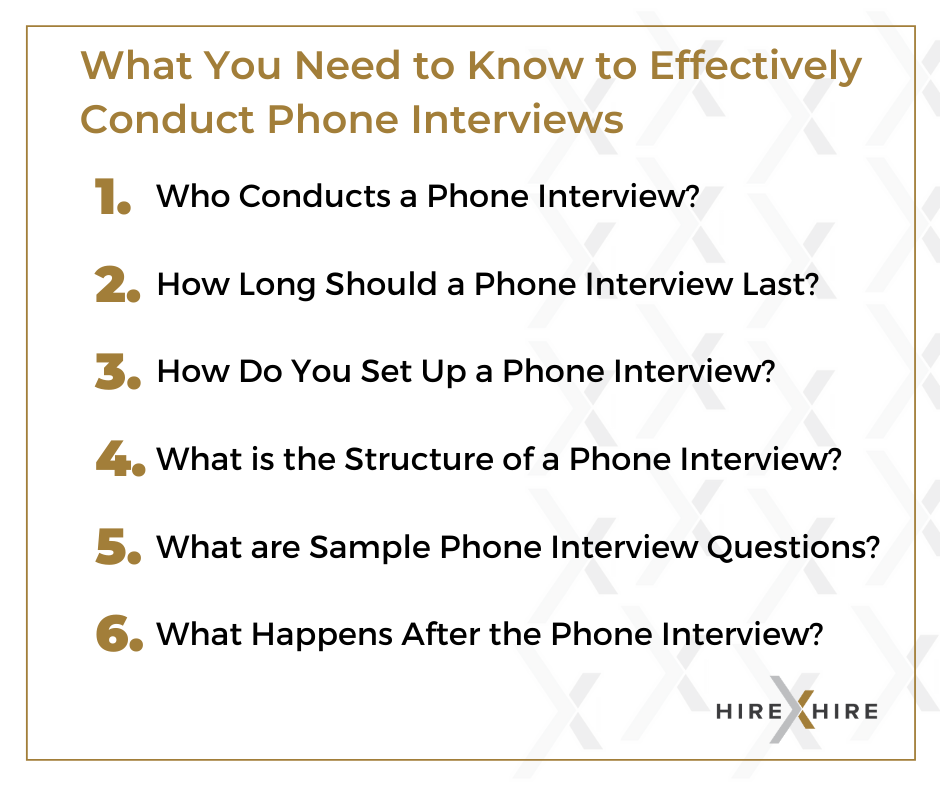Recruiting Framework Step 2: Narrow Your Funnel with Phone Interviews
This is Step 2 of a five-part series on building and managing your pragmatic recruiting framework. Click to read the overview to all five steps here or Part 1: Build Your Talent Pipeline here.
Step 2: Narrow Your Funnel with Phone Interviews
How to Conduct a Phone Interview with Sample Interview Questions:
On paper, the candidate is intriguing. Their credentials seem like a good fit, and they’ve managed to hook enough of your attention that you are now considering spending more of your valuable time getting to know them better. But, can you really trust a resume? You can’t even assume the resume is the candidate’s own work, given the rise in popularity of professional resume services. This is just one reason the next step of your pragmatic recruiting framework is so critical. The phone screen is your first opportunity to engage and vet the candidate personally.
First & Foremost, What is a Phone Interview?
It’s fairly straightforward. A phone interview is simply a short phone call with a candidate who has expressed interest in your job opening to evaluate their basic fit for the role. It’s also your opportunity to differentiate YOUR organization, culture, and career opportunity from the competition. Never forget that the employer and candidate are interviewing each other.
If You’re Overwhelmed, Fret No More. We’ve Got You.
The interview structure is critical to the productivity of the evaluation, and the downstream effectiveness of the in-person interviews, and ultimately the use of your hiring team’s time. We’ve compiled a simple and effective phone interview structure to help you get the most out of your phone conversation AND ensure the candidate has a positive interview experience.
Who Conducts a Phone Interview?
The ‘who’ will vary by company and role. But typically, phone interviews are conducted by a recruiter or hiring manager. Regardless of who you assign to conduct the phone interviews, the same person should conduct all phone interviews for a given position. This sets a foundation for consistent head-to-head evaluations, reducing variability in the manner of questioning, and therefore the quality of the candidate who moves forward in the interview process.
How Long Should a Phone Interview Last?
Again, the ideal length of an effective phone interview depends on the experience level and the type of role – but the amount of time required is highly correlated to the complexity of the required skill set.
For Example: Entry-level positions or other job openings requiring fewer qualifications should equal a shorter phone screen. The interviewer has fewer skills to vet. On the flip side, senior roles (management, executive hires, or highly technical jobs) should require more time. The interviewer will require additional time to dig deeper to make a better assessment.
On average, how long should an effective phone screen last—plan for 30 to 45 minutes for standard roles. The person scheduling the interview should set the time and duration expectation with the candidate before the meeting. Then stick to that time frame. If you find yourself running short on time, extend 15 minutes for the next candidate. You can always end early.
Remember: Many candidates are currently employed. It is likely she or he is using their lunch hour or break to step away from work. Be respectful of the agreed-upon time duration. A major contributing factor to a positive candidate experience is providing the same professional courtesy to the candidate as you would a client, colleague, or other professional contacts.
How Do You Set Up a Phone Interview?
Once you have sifted through your candidate pipeline, identified an applicant with potential, and decided you’d like to interview them, it’s time to make contact. The simplest and most common first contact is to reach out to the candidate via email and invite them to participate in a phone conversation. Typically, the recruiter will exchange a few emails with a candidate, exchanging pleasantries and negotiating mutual availability within an imminent window of business days.
Once you have agreed upon a time, make the confirmation obnoxiously clear. Confirm all details via email, and both parties should also confirm the meeting by RSVPing ‘yes’ to a calendar invitation. Your phone screening confirmation email should detail:
Will, the interviewer, call the applicant directly, or will they dial into a conferencing call?
Does your company prefer to do video chat?
If yes, make that clear and provide the link in a calendar invite.
Encourage the applicant to download any necessary video application before avoiding the dreaded “can you hear me now?” technical difficulties. We’ve got more tips for you on video interviews here.
If the call details change for any reason, notify the candidate immediately. Apologize for the change, and offer any known details for rescheduling. Qualified candidates have removed themselves from an interview process for less than being ghosted for a phone call. A bad applicant experience can elicit bad reviews on Glassdoor or other platforms.
What is the Structure of a Phone Interview?
We have outlined a sample phone interview structure that you can use as a foundation for your process below. The phone interview outline below covers critical points to have a productive phone screening with a candidate. It is short enough to add in a few questions relevant to your company or role and still complete within the ideal phone interview timing.
Introduction (5 mins)
The interviewer makes introductions and thanks to the interviewee for joining the call.
The interviewer lays out the basic outline for the call.
The interviewer discusses the general expectations of the role and confirms that the interviewee is interested in this specific role before continuing.
Q&A (20 mins)
The interviewer asks the interviewee to walk through their work experience in detail. This should include job experience, accolades, details of performance reviews or promotions, and other relevant information. The interviewee should also share why they are looking to leave their current company or why they already left.
The interviewer asks what the interviewee’s job aspirations are and what is important to find in their next position.
Wrap Up | Candidate Questions (5 mins)
The interviewer confirms the basic job requirements – location, hours, travel, start date, salary range – to the interviewee. The interviewer should try to understand if there are any non-starters at a fundamental level that would keep the candidate from being a fit for the company.
The interviewer asks the interviewee what questions they have about the company or position at this point.
The interviewer shares the typical next step(s) of the company’s interview process and a potential timeline for filling the role.
Sample Phone Interview Questions
The questions you ask a candidate will vary depending on your company's role and experience, but some basic questions can help you determine if you should move forward with a candidate.
What are your primary responsibilities in your current position? How much time do you spend on each in any given day or week?
What is a project or initiative you led from your most recent role that you’re particularly proud of? What was the result?
What challenges did you face in your first 30 / 60 / 90 days on the job, and how did you overcome them?
Explain your career progression and what prompted you to make job/role/company changes when you did?
Who do you report to in your current role? What feedback have you been given regarding your performance (ask for both positives and areas for improvement)?
What is an ideal situation for you in your next role? What’s important to you in your job search?
What are some of your personal and professional goals? What do you aspire to accomplish in the next 5-to-10 years?
What Happens After the Phone Interview?
First: Document the Feedback
After the phone screening, the interviewer should document their notes about the candidate and submits feedback to their applicant tracking system (ATS). If you don’t have an ATS, you can use a Google Spreadsheet or Excel Spreadsheet. Draft your questions in column A and enter the responses in column B. Then, duplicate the tab per candidate to ensure consistent data is collected in one place. After your notes are complete, share them with any other stakeholders involved in the hiring process.
Second: Communicate the Candidate Status
The interviewer should decide to move the candidate forward or not within 24 to 48 hours. You need to tell the candidate - even if the answer is no! Many employers miss or dismiss this step without realizing how it impacts their employer brand. Informing a candidate of your decision quickly will keep an applicant excited about your open role or close the loop and allow the candidate to move on to other positions. In a competitive hiring environment, candidates often evaluate multiple job opportunities at once, and delaying a decision to move forward with a candidate could be the difference between landing the candidate or missing the boat.
In Conclusion
Phone interviews are a company’s first chance to get to know a candidate who meets the qualifications of a position on paper, and it’s often the first human interaction a candidate will receive as part of their interview process. Interviewing is a two-way street. An effective phone interview draws out relevant, tangible information from the candidate AND allows the interviewer to articulate the organization’s value proposition as an employer.
The phone screen sets the stage for the later steps of the recruiting process. If done correctly, it can set a company up for a great relationship with its next employee. Done poorly, and it can cost a company their ideal candidate. Use these guidelines to help both your company and candidates get the most out of the phone interview and to help you fill open job positions with the best candidates possible.
If you need helping to build your Phone Screening framework, establishing your ATS or interview feedback form template, contact our Chief Talent Officers here. We can help build your team, hire by hire.









